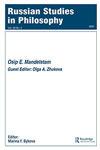“那些出生在被上帝遗弃的年代的人……”
IF 0.1
4区 哲学
Q4 Arts and Humanities
引用次数: 0
摘要
本文以20世纪70年代至90年代这一代人的命运为背景,讨论了在一个强大而看似永恒的帝国的机器正在“撕裂”他们的时候,将解体时期联系起来的可能性。作者在自己的个人经历、苏联后期的文化特征、文化机构的运作以及代际间的对话与互动的背景下,突出了20世纪最后三分之一的“哲学一代”的特征。他认为这一代人的一个特征是哲学史的主导地位,在这种主导下,理解我们时代尖锐问题的过程经常发生。文章认为,代际对话甚至可以发生在国家意识形态政策有意将个人和群体彼此隔离并与当代国际社会隔离的条件下。本书特别关注“文化学”现象,这门科学一方面是“改革”的人造产物,但另一方面,它是克服我们与全球文化分离的生产性尝试的结果,将以前时代积累的人类知识整合为一种整体理解。文化学的镜子反映了20世纪末几代人的整个动态。本文章由计算机程序翻译,如有差异,请以英文原文为准。
“Those born in godforsaken years . . .”
ABSTRACT Against the backdrop of the fate of the generation that peaked between the 1970s and 1990s, this article discusses the possibility of linking times of disintegration even when the machine of a powerful and seemingly eternal empire was working at “rupturing” them. The author highlights the features of the “philosophical generation” of the last third of the twentieth century in the context of his own personal experience, the cultural characteristics of the late Soviet era, the functioning of cultural institutions, and dialogue and interaction between generations. He sees a characteristic feature of this generation as the dominance of history of philosophy, under which auspices the process of comprehending the acute problems of our own times often took place. The article argues that intergenerational dialogue can take place even in conditions created by state ideological policy for purposefully isolating individuals and groups both from each other and from the contemporary international community. Special attention is devoted to the phenomenon of “culturology,” a science that was, on the one hand, an artificial product of “perestroika,” but on the other hand, the result of productive attempts to overcome our separation from global culture, to integrate the human knowledge accumulated in previous eras into a kind of holistic understanding. The mirror of culturology reflected entire dynamics of generations at the end of the twentieth century.
求助全文
通过发布文献求助,成功后即可免费获取论文全文。
去求助
来源期刊

RUSSIAN STUDIES IN PHILOSOPHY
PHILOSOPHY-
CiteScore
0.10
自引率
0.00%
发文量
14
期刊介绍:
Russian Studies in Philosophy publishes thematic issues featuring selected scholarly papers from conferences and joint research projects as well as from the leading Russian-language journals in philosophy. Thematic coverage ranges over significant theoretical topics as well as topics in the history of philosophy, both European and Russian, including issues focused on institutions, schools, and figures such as Bakhtin, Fedorov, Leontev, Losev, Rozanov, Solovev, and Zinovev.
 求助内容:
求助内容: 应助结果提醒方式:
应助结果提醒方式:


